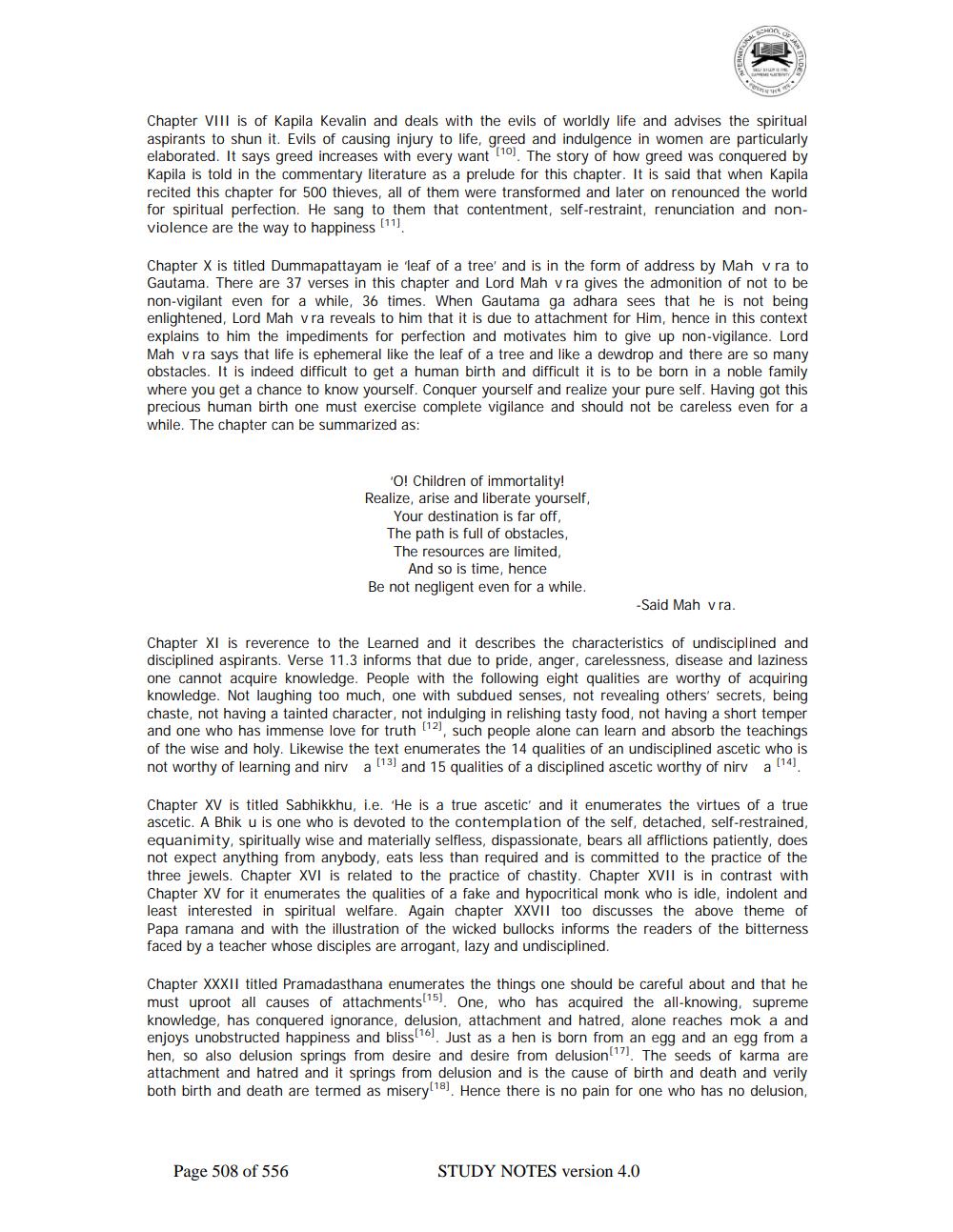________________
Chapter VIII is of Kapila Kevalin and deals with the evils of worldly life and advises the spiritual aspirants to shun it. Evils of causing injury to life, greed and indulgence in women are particularly elaborated. It says greed increases with every want . The story of how greed was conquered by Kapila is told in the commentary literature as a prelude for this chapter. It is said that when Kapila recited this chapter for 500 thieves, all of them were transformed and later on renounced the world for spiritual perfection. He sang to them that contentment, self-restraint, renunciation and nonviolence are the way to happiness (11]
Chapter X is titled Dummapattayam ie 'leaf of a tree and is in the form of address by Mah vra to Gautama. There are 37 verses in this chapter and Lord Mah v ra gives the admonition of not to be non-vigilant even for a while, 36 times. When Gautama ga adhara sees that he is not being enlightened, Lord Mah vra reveals to him that it is due to attachment for Him, hence in this context explains to him the impediments for perfection and motivates him to give up non-vigilance. Lord Mah v ra says that life is ephemeral like the leaf of a tree and like a dewdrop and there are so many obstacles. It is indeed difficult to get a human birth and difficult it is to be born in a noble family where you get a chance to know yourself. Conquer yourself and realize your pure self. Having got this precious human birth one must exercise complete vigilance and should not be careless even for a while. The chapter can be summarized as:
'O! Children of immortality! Realize, arise and liberate yourself
Your destination is far off, The path is full of obstacles, The resources are limited,
And so is time, hence Be not negligent even for a while.
-Said Mah vra.
Chapter XI is reverence to the Learned and it describes the characteristics of undisciplined and disciplined aspirants. Verse 11.3 informs that due to pride, anger, carelessness, disease and laziness one cannot acquire knowledge. People with the following eight qualities are worthy of acquiring knowledge. Not laughing too much, one with subdued senses, not revealing others' secrets, being chaste, not having a tainted character, not indulging in relishing tasty food, not having a short temper and one who has immense love for truth 12), such people alone can learn and absorb the teachings of the wise and holy. Likewise the text enumerates the 14 qualities of an undisciplined ascetic who is not worthy of learning and nirv a 13 and 15 qualities of a disciplined ascetic worthy of nirv a 14.
Chapter XV is titled Sabhikkhu, i.e. 'He is a true ascetic and it enumerates the virtues of a true ascetic. A Bhik u is one who is devoted to the contemplation of the self, detached, self-restrained, equanimity, spiritually wise and materially selfless, dispassionate, bears all afflictions patiently, does not expect anything from anybody, eats less than required and is committed to the practice of the three jewels. Chapter XVI is related to the practice of chastity. Chapter XVII is in contrast with Chapter XV for it enumerates the qualities of a fake and hypocritical monk who is idle, indolent and least interested in spiritual welfare. Again chapter XXVII too discusses the above theme of Papa ramana and with the illustration of the wicked bullocks informs the readers of the bitterness faced by a teacher whose disciples are arrogant, lazy and undisciplined.
Chapter XXXII titled Pramadasthana enumerates the things one should be careful about and that he must uproot all causes of attachments (15) One, who has acquired the all-knowing, supreme knowledge, has conquered ignorance, delusion, attachment and hatred, alone reaches mok a and enjoys unobstructed happiness and bliss 16. Just as a hen is born from an egg and an egg from a hen, so also delusion springs from desire and desire from delusion!17! The seeds of karma are attachment and hatred and it springs from delusion and is the cause of birth and death and verily both birth and death are termed as misery 18). Hence there is no pain for one who has no delusion,
Page 508 of 556
STUDY NOTES version 4.0




